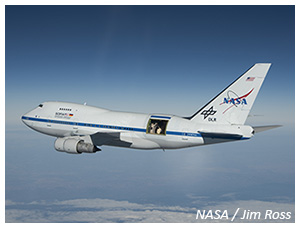Call for Observing Proposals: SOFIA Cycle 4

Richard Fienberg AAS Solar Eclipse Task Force
This announcement is posted on behalf of SOFIA Science Mission Operations (NASA & USRA):
The Stratospheric Observatory for Infrared Astronomy (SOFIA) Cycle 4 observing Call for Proposals (CfP) was released on 1 May 2015.
The call solicits observing proposals from the US and international astronomical community for up to 450 hours of science observing using SOFIA and is issued on behalf of NASA by the Universities Space Research Association (USRA).
The Cycle 4 observing period will be from 1 February 2016 to 31 January 2017.
The deadline for proposal submission is 04:00 UTC on 11 July 2015, or 21:00 Pacific Daylight Time on Friday, 10 July. Proposal selections will be announced in early October 2015.
The proposal process consists of two phases. Phase I requires the preparation and submission of a scientific context, a scientific justification, a feasibility analysis, and a high-level description of the proposed targets and observations. Peer review and proposal selection will be based on the Phase I submission. Proposers who are awarded time will be required to submit detailed observation specifications during Phase II.
A formal update to the CfP is scheduled for 8 June 2015. However, no major changes in capabilities are expected relative to those described in the current version of the Cycle 4 CfP document.
The SOFIA Cycle 4 Call for Proposals document (in PDF format), links to the Observer's Handbook for Cycle 4, and other details about preparing and submitting a proposal can be found at the "Cycle 4: Phase I Information" link from the main Cycle 4 CfP webpage.
SOFIA is a joint project of NASA and the German Aerospace Center (DLR). The aircraft is based at the NASA Armstrong Flight Research Center's Facility in Palmdale, Calif. NASA Armstrong Flight Research Center manages the program. NASA Ames Research Center at Moffett Field, Calif., manages the SOFIA science and mission operations in cooperation with the Universities Space Research Association (USRA) headquartered in Columbia, Md., and the German SOFIA Institute (DSI) at the University of Stuttgart.


